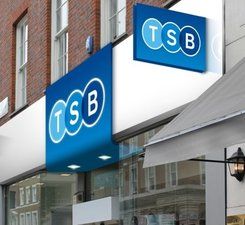TSB is opening 30 new branches, but has not said where. The bank, which used to belong completely to Lloyds until one year ago, says it is in the process of acquiring the branch sites.
Most British media are betting the new branches will be in the English South East and Midlands.
The announcement contrasts with the ongoing closures, that have totaled more than 300 branches so far.
Since an initial public offering (IPO) in June 2014, the TSB Banking Groups Plc has been listed on the London Stock Exchange. The Lloyds Banking Group still owns 61.5% of the company.
Lloyds had to sell off its stake in TSB because of a European Commission ruling that the British taxpayer’s purchase of a 43.4% stake in the group in 2009 – a bailout – amounted to state aid. The ruling required that Lloyds sell off a portion of TSB.
At the beginning of September 2014, TSB Banking Group was included in London’s FTSE 250 Index that lists the 101st to 350th largest companies by market capitalization on the London Stock Exchange.
Paul Pester, Chief Executive Officer, said TSB plans to invest about ₤250 million over the next five years as part of the company’s strategic strategies.
How would a Scottish Independence vote affect TSB?
TSB is incorporated in London, but its banking license was issued in Scotland. One quarter of its mortgage lending is in Scotland. So how will the Scottish Independence Referendum on September 18th affect the bank?

According to most polls, the “Yes” (for Independence) vote has caught up with the “No” – they are currently neck-and-neck.
The BBC reported that UK banks with branches in Scotland have begun holding more cash in those branches in case there is a rush to take out money after the referendum.
Would a “Yes” vote trigger a flood of Scots taking their cash out and moving it into branches south of the border? So far, there is no evidence yet of this, but the fact that financial institutions have prepared for such an event and the Bank of England is also watching makes one wonder.
On Monday, shares in the Royal Bank of Scotland (RBS) and Edinburgh-based Lloyds Banking group (which is still a TSB major shareholder) fell soon after an opinion poll showed the “Yes” vote was ahead.
Reuters quoted unnamed people familiar with Scottish banking who said that Lloyds is considering moving its registered offices to London if Scotland votes for independence.
Both Lloyds and RBS have already said that an independent Scotland would present a considerable risk to their businesses, which would affect their funding, tax and compliance costs.
Lloyds and RBS are still owned by the British taxpayer – a total of ₤66 billion ($106 billion) was spent bailing them out during the 2008 financial crisis. The aim is to privatize them one day. With an independent Scotland, the process would be much more complicated, analysts say.
The UK government owns 25% of Lloyds and 81% of RBS.
